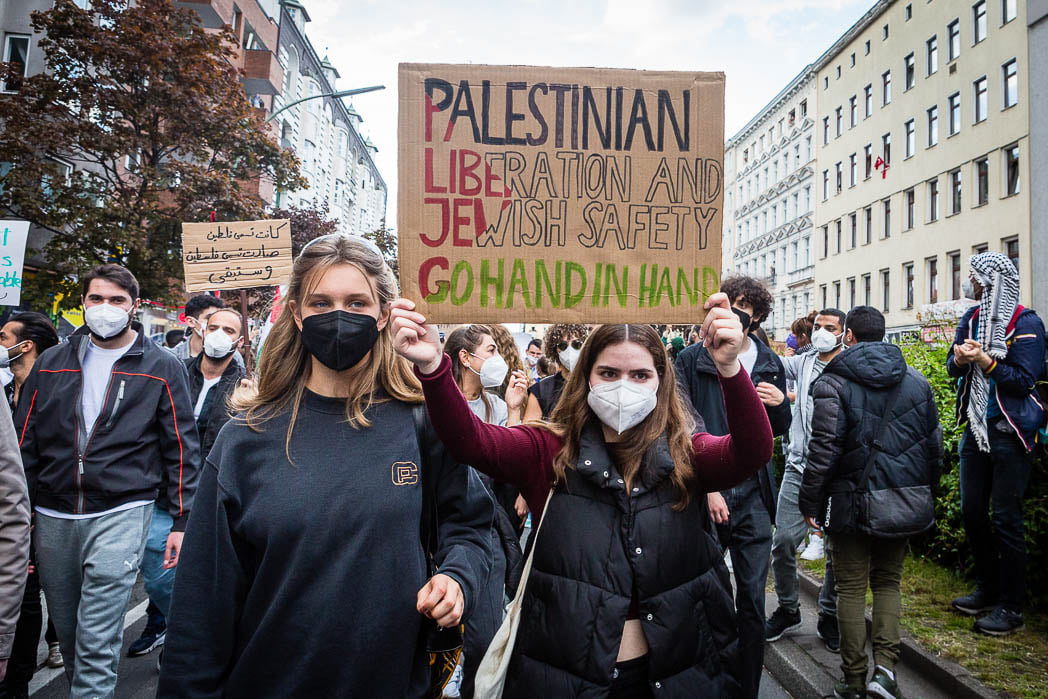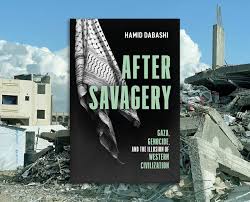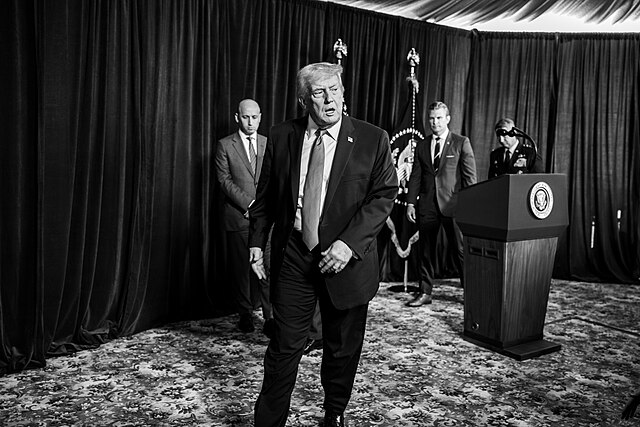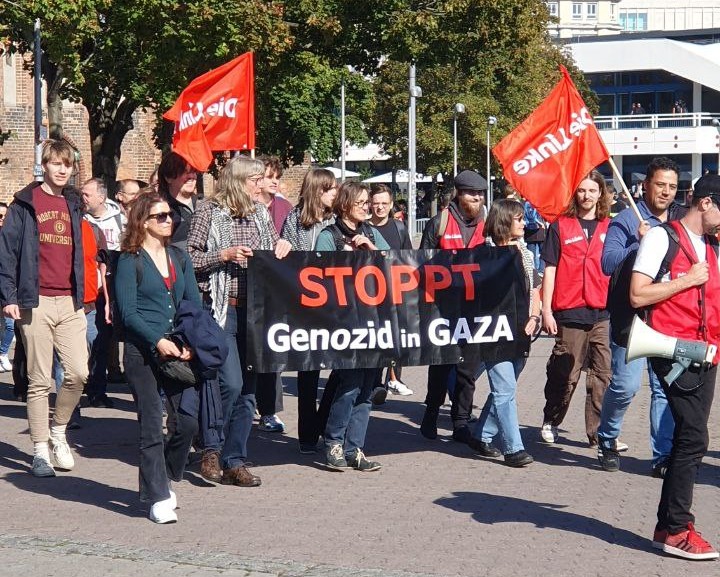Following the news last Friday, November 1st, of a second leak of the text of the Bundestag resolution ‘Never again is now: Protect, preserve and strengthen Jewish life in Germany’, Arts & Culture Alliance Berlin and the cultural center Oyoun held an event under the name ‘Surveillance, Censorship, and Criminalization: An Emergency Public Reading and Discussion on the Leaked Bundestag Resolution’ to address the implications of the new policy, slated for a vote this week. Ostensibly aimed at safeguarding Jewish life in Germany, the resolution has faced severe backlash for what critics claim is a thinly veiled attempt to stifle dissent and criminalize criticism of the state of Israel. Despite the venue’s capacity limits, a crowd gathered beyond those registered, portraying the urgency and high public interest in the topic. In a climate of increased scrutiny by the mainstream media and a newly reinvigorated German McCarthyism, attendees were asked to refrain from recording video or audio to avoid hostile media infiltration, which has previously misrepresented such events. The discussion unfolded peacefully, with participants expressing deep concerns over the resolution’s potential impact on civil liberties and public discourse.
The resolution, signed by the Ampel coalition and the CDU/CSU, was initially leaked over the summer, sparking widespread criticism across Germany’s media and civil society. Condemned as unconstitutional, repressive, and contrary to international law, the resolution has been widely viewed as a perilous attack on freedom of expression, artistic and scientific freedom, and the right to political dissent. Many critics have pointed out that the document conflates antisemitism with criticism of Israeli policy, a move that threatens to undermine legitimate political expression. The issue was compounded by the fact that the resolution was drafted behind closed doors to avoid further leaks, excluding broad civil society input, as well as consultation with most Bundestag members, save for a single representative from each major party.
Sunday’s event opened with a reading of the English translation of the resolution by a prominent German actress, underscoring its vague and sweeping language. The document alleges that there is “an increasingly open and violent antisemitism in right-wing extremist and Islamist milieus as well as a relativizing approach and increasing Israel-related and left-wing anti-imperialist antisemitism” and warns of “the alarming extent of antisemitism based on immigration from North Africa and the Middle East, where antisemitism and hostility towards Israel are widespread, partly due to Islamist and anti-Israeli state indoctrination”. Critics, however, argued that these statements dangerously oversimplify and racialize complex issues, deflecting responsibility away from Germany’s own historical roots of antisemitism. Furthermore, by conflating antisemitism with any critique of Israel, the resolution appears to silence meaningful discourse about Israeli policies and the rights of Palestinians.
Following the reading, speakers, whom we have decided not to name for reasons of confidentiality, highlighted the resolution’s ambiguity and raised questions about its legal viability. As a non-binding resolution rather than a formal law, it will not undergo the constitutionally mandated legislative process, which means it will be challenging to contest in court despite its potentially unconstitutional restrictions on freedom of expression. Yet, state offices could invoke this resolution to justify punitive actions, exploiting its vague language while bypassing constitutional safeguards.
Speakers observed that the resolution seeks to redefine antisemitism in ways that link Jewish identity intrinsically to Israel, framing critiques of Israeli policies as attacks on Jewish people themselves. By presenting Israel as the “Jew among states” and implying that Jewish identity is inseparable from Zionist ideology, the resolution risks creating a climate where even non-violent opposition to Israeli state practices is viewed as antisemitic. As one speaker noted, this resolution is not about protecting Jewish life, but about conflating Jewish identity with Israeli nationalism, to suppress solidarity with Palestine.
The resolution’s emphasis on increased oversight in the arts and academia also raised significant concerns. It references recent controversies, such as those at Documenta 15 and the Berlinale, as justification for intensifying scrutiny and regulation within cultural and academic institutions. With proposals for “antisemitism-critical codes of conduct”, many fear that the resolution could stifle artistic freedom, limit public funding for projects deemed critical of Israel, and create a chilling effect in academic settings. Among the suggested measures is for universities to enforce “house rules” to deny entry or expel students and staff whose views are interpreted as antisemitic, and “to appoint antisemitism officers at universities across the board”—a troubling development for free speech in Germany’s institutions, given the arbitrariness with which these measures could be implemented.
The resolution also highlights antisemitism as stemming from immigration, particularly from North African and Middle Eastern communities, a framing that participants criticized as scapegoating. This language risks fueling xenophobic narratives, framing Muslim and Arab communities as inherently antisemitic and ignoring the German state’s own history of antisemitism. One panelist remarked that by placing blame on immigrant communities, Germany sidesteps its responsibility while reinforcing damaging stereotypes. The resolution’s portrayal of “Israel solidarity” as integral to Jewish identity disregards the diversity within Jewish communities, especially those who actively oppose the Israel’s policies toward Palestinians.
Concerns were expressed over how these narratives pit marginalized groups against each other, dividing communities and stifling solidarity. As the discussion progressed, the resolution was described as not only undermining Palestinian rights but also as a vehicle for Germany to “project blame onto the other” while shielding itself from critique. This tactic is a clear means to avoid confronting Germany’s complicity in contemporary international conflicts and human rights abuses and, more importantly, to avoid confronting its past.
In response to the resolution’s threat to freedom of expression, speakers emphasized the importance of continued resistance. Organizations such as the European Legal Support Center and 3EZWA were highlighted for their work monitoring discrimination against Palestine solidarity movements in Germany and for offering legal assistance. Others advocated for proactive steps, including disrupting institutional silence on the issue and increasing international visibility around Germany’s policies toward Palestine.
Another focal point of discussion was the need to hold German cultural and academic institutions accountable, especially regarding potential funding restrictions for projects perceived as critical of Israel. Among the suggested strategies were joining unions, participating in direct actions, and working within institutions to amplify dissenting voices, and demand transparency in funding and policy decisions.
As the event came to a close, it was clear that the Bundestag resolution represents more than a repressive undemocratic policy; it signals a deeper ideological struggle within Germany that has global implications. It is a measure that disproportionately targets migrant communities and minorities, who have been at the forefront of the protests from the beginning—in contrast to the German population, which is more reluctant to take to the streets in this regard. The even graver paradox is that, after the Palestinian and the Arab population, the main target is precisely a part of the Jewish community, which is leading various protest movements.
Hence the importance of continued resistance against state narratives that seek to equate antisemitism with anti-Zionism, emphasizing that solidarity with Palestine is not only a matter of social justice but a vital act of free expression. This is why we appeal not only to allies of the movement for freedom of the Palestinian people, but to anyone who believes in the values of the human, democratic, and civil rights of free expression, association, and protest. When rights are restricted to some, they are, in reality, restricted to all.
In a powerful closing statement, one speaker urged for a global response, highlighting that Germany cannot avoid international scrutiny. Just as apartheid South Africa faced worldwide condemnation, so must Israel’s actions in the Occupied Palestinian Territories and the discriminatory and complicit policies of Germany.




